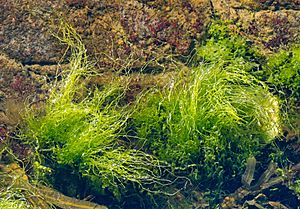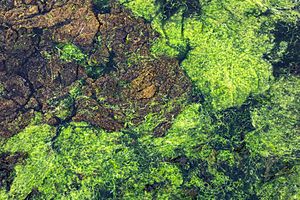Ulva intestinalis facts for kids
Quick facts for kids Ulva intestinalis |
|
|---|---|
 |
|
| Scientific classification | |
| Genus: |
Ulva
|
| Species: |
intestinalis
|
| Synonyms | |
|
|
Ulva intestinalis is a green alga in the family Ulvaceae, known by the common names sea lettuce, green bait weed, gutweed and grass kelp. Until they were reclassified by genetic work completed in the early 2000s, the tubular members of the sea lettuce genus Ulva were placed in the genus Enteromorpha.
Distribution
Generally world-wide. It can be found in Bering Sea near Alaska, Aleutian islands, Puget Sound, Japan, Korea, Mexico, Philippines, and Russia. Besides this, places it can be found in Israel, and in such European countries as Azores, Belgium, Denmark, Ireland, Norway, Poland, and in such seas as the Baltic, and Mediterranean Sea. It is also found in the shores of the Pacific Ocean including in New Zealand.
Description
The fronds have branches and are completely tubular expanding in width to mid-thallus, reaching 15 cm long or more. The cells are irregularly arranged and the chloroplast is hood-shaped and placed to one side, generally with only one pyrenoid. The species may be 10–30 centimetres (3.9–11.8 in) long and 6–18 millimetres (0.24–0.71 in) wide. They have rounded tips as well. The alga may be reproductive at all times of the year, and has a life-cycle with alternation of generations, in which the gametophyte and sporophyte are isomorphic, having identical morphology. In some references the species (Ulva intestinalis) is treated as two subspecies: ssp. intestinalis (L.) Link and ssp. compressa (L.) Link.
In other languages
- Danish: tarm-rørhinde
- Dutch: echt darmwier
- French: entéromorphe
- German: Darmtang, gemeiner Darmtang
- Norwegian: tarmgrønske
- Polish: sałata, taśma, watka
- Swedish: tarmalg
- Thai: สาหร่ายไส้ไก่
- Portuguese: erva-patinha
See also
 In Spanish: Ulva intestinalis para niños
In Spanish: Ulva intestinalis para niños


